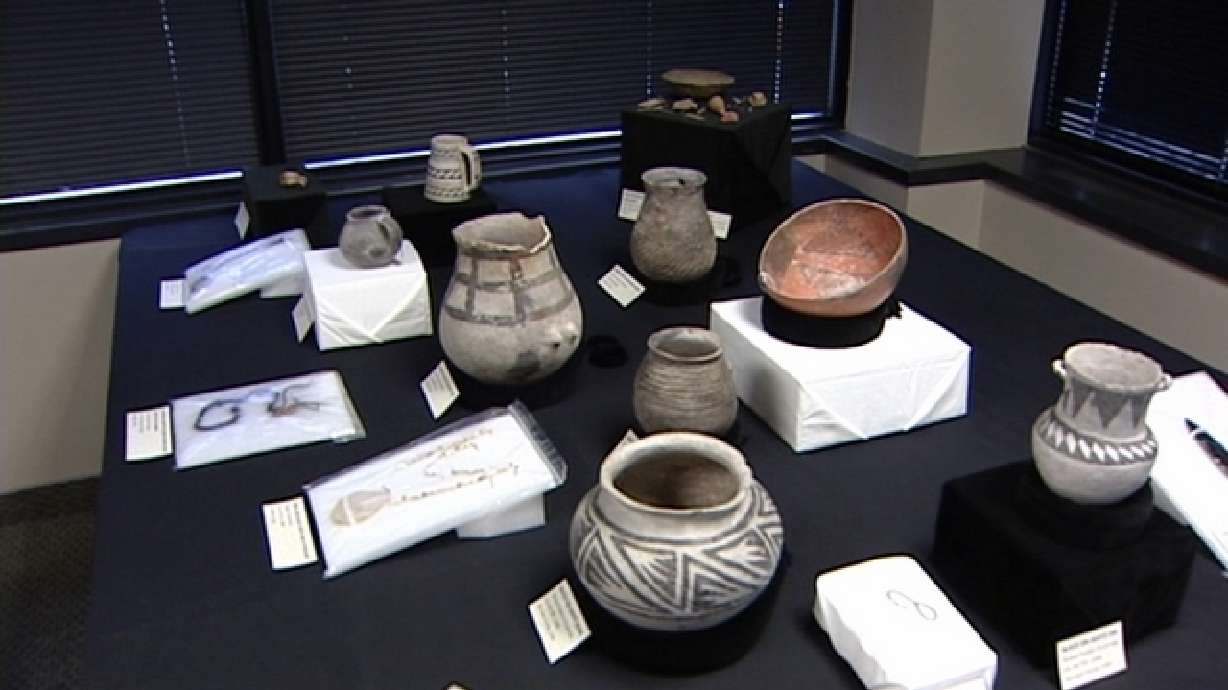Estimated read time: 4-5 minutes
This archived news story is available only for your personal, non-commercial use. Information in the story may be outdated or superseded by additional information. Reading or replaying the story in its archived form does not constitute a republication of the story.
SALT LAKE CITY — Four people charged in the biggest bust ever of Native American artifacts looting are scheduled for trial next month in a case that could turn on the purported value of beads and bracelets.
Federal prosecutors recently turned up the heat on Joseph M. Smith, his wife Meredith Smith, Tad Kreth and Reece Laws with a third superseding indictment alleging 38 felony counts of trafficking in archaeological resources, theft of tribal and government property, and conspiracy. They originally faced a total of 27 counts.
It appears to be a real attempt to justify what has gone on, to justify the cost (of the investigation), as opposed to meting out justice.
–Attorney Benjamin Hamilton
The new indictment basically charges them with four felonies for each allegedly stolen and sold artifact. Those items include a sandal, a turquoise pendant, a copper bracelet, polishing stones and ivory bead necklaces.
"It appears to be a real attempt to justify what has gone on, to justify the cost (of the investigation), as opposed to meting out justice," said attorney Benjamin Hamilton, who represents Joseph M. Smith, the only defendant charged in all 38 counts. Kreth faces 17, Laws nine and Meredith Smith six.
The four were among 25 Utah, Colorado and New Mexico residents arrested in 2009 after a two-year sting operation in the Four Corners area. A confidential informant, Ted Gardiner, bought 256 Native American relics for a total of $335,685 during that time. Gardiner and two defendants — James D. Redd, of Blanding, and Steven L. Schrader, of Durango, Colo., committed suicide after prosecutors filed criminal charges.
To date, none of the defendants have gone to trial. More than half pleaded guilty to reduced charges and were placed on probation.
On Monday, U.S. District Judge Clark Waddoups terminated the remaining 18 months and six months, respectively, of probation for Redd's wife, Jeanne Redd, and daughter Jerica Redd. Both had paid fines in full and had complied with all conditions of their probation, according to court records.
Defense claims price of items "completely inflated"
The additional counts against the Smiths, Kreth and Laws, came as the defense served notice to call an expert witness to testify that federal officials "completely inflated" the values of the artifacts in order to file felony rather than misdemeanor charges, Hamilton said.

Prosecutors can file felony charges if the artifacts in question are valued at more than $500. All of those in the indictment are listed for at least that much, and the confidential informant paid between $4,600 and $9,840 for some of them.
"For each item they're charging four felonies on what otherwise would be a misdemeanor," Hamilton said. "They must need to justify the extreme amounts of money they paid to Ted Gardiner for these items."
Asked if the additional charges are an attempt to put pressure on the defendants, he said, "In light of the fact that it came on the heels of our notice to call an expert, it could be construed that way."
Federal prosecutors attempted to exclude the defense's expert witness, Dace Hyatt, calling him biased because he valued every artifact at less than $500 in his report to the court. But U.S. District Judge Ted Stewart ruled Hyatt's 20 years' experience in the Native American antiquities market qualifies him as an expert who may testify at the trial scheduled to begin May 4.
Stewart ruled that prosecutors can raise their concerns before a jury on cross-examination of Hyatt.
Attorney: Case similar to pawning stolen goods
U.S. Attorney for Utah spokeswoman Melodie Rydalch said Tuesday prosecutors are not comfortable talking about the case so close to the trial date.
But she explained the additional theft counts — which allege the money made from selling artifacts stolen from public lands belongs to the government — are similar to pawning stolen goods: Sellers aren't entitled to the proceeds because the items weren't theirs to sell.
So far none of the other defendants in the case have challenged the value the government placed on the artifacts. Hamilton said most were unsophisticated when it comes to Native American antiquities and have pleaded guilty without knowing what the items were worth.
"They think it's hidden treasure. It's frankly not," he said. "In reality, they're not worth those large dollar amounts."
Hamilton said his client, Joseph M. Smith, intends to admit in court that he took artifacts from public lands. "But what he is guilty of is a misdemeanor."
Smith, he said, is not a seller or trader in American Indian relics. Prior to his arrest, an arrowhead was the only item he had ever sold.
"He wasn't like some of the others that had literally truckloads of artifacts," Hamilton said. "He was more of a construction worker who walks through the desert."
Email:dromboy@ksl.com









